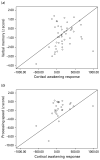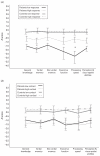Abnormal cortisol awakening response predicts worse cognitive function in patients with first-episode psychosis
- PMID: 20529412
- PMCID: PMC3513413
- DOI: 10.1017/S0033291710001170
Abnormal cortisol awakening response predicts worse cognitive function in patients with first-episode psychosis
Abstract
Background: Cognitive impairment, particularly in memory and executive function, is a core feature of psychosis. Moreover, psychosis is characterized by a more prominent history of stress exposure, and by dysregulation of the hypothalamic-pituitary-adrenal (HPA) axis. In turn, stress exposure and abnormal levels of the main HPA axis hormone cortisol are associated with cognitive impairments in a variety of clinical and experimental samples; however, this association has never been examined in first-episode psychosis (FEP).
Method: In this study, 30 FEP patients and 26 controls completed assessment of the HPA axis (cortisol awakening response and cortisol levels during the day), perceived stress, recent life events, history of childhood trauma, and cognitive function. The neuropsychological battery comprised general cognitive function, verbal and non-verbal memory, executive function, perception, visuospatial abilities, processing speed, and general knowledge.
Results: Patients performed significantly worse on all cognitive domains compared to controls. In patients only, a more blunted cortisol awakening response (that is, more abnormal) was associated with a more severe deficit in verbal memory and processing speed. In controls only, higher levels of perceived stress and more recent life events were associated with a worse performance in executive function and perception and visuospatial abilities.
Conclusions: These data support a role for the HPA axis, as measured by cortisol awakening response, in modulating cognitive function in patients with psychosis; however, this association does not seem to be related to the increased exposure to psychosocial stressors described in these patients.
Figures


Similar articles
-
[Stress and psychotic transition: A literature review].Encephale. 2016 Aug;42(4):367-73. doi: 10.1016/j.encep.2015.10.001. Epub 2016 May 6. Encephale. 2016. PMID: 27161263 Review. French.
-
Cortisol awakening response and diurnal cortisol among children at elevated risk for schizophrenia: relationship to psychosocial stress and cognition.Psychoneuroendocrinology. 2014 Aug;46(100):1-13. doi: 10.1016/j.psyneuen.2014.03.010. Epub 2014 Mar 29. Psychoneuroendocrinology. 2014. PMID: 24882153 Free PMC article.
-
Abnormal cortisol levels during the day and cortisol awakening response in first-episode psychosis: the role of stress and of antipsychotic treatment.Schizophr Res. 2010 Feb;116(2-3):234-42. doi: 10.1016/j.schres.2009.08.013. Epub 2009 Sep 13. Schizophr Res. 2010. PMID: 19751968 Free PMC article.
-
Hypothalamic-pituitary-adrenal axis measures and cognitive abilities in early psychosis: Are there sex differences?Psychoneuroendocrinology. 2016 Oct;72:54-62. doi: 10.1016/j.psyneuen.2016.06.006. Epub 2016 Jun 7. Psychoneuroendocrinology. 2016. PMID: 27344379
-
Much ado about much: stress, dynamic biomarkers and HPA axis dysregulation along the trajectory to psychosis.Schizophr Res. 2015 Mar;162(1-3):253-60. doi: 10.1016/j.schres.2015.01.010. Epub 2015 Jan 22. Schizophr Res. 2015. PMID: 25620122 Review.
Cited by
-
Altered neutrophil-to-lymphocyte ratio in patients with non-affective first episode psychosis and its relationship with symptom severity and cognitive impairment.Sci Rep. 2023 Jul 15;13(1):11453. doi: 10.1038/s41598-023-37846-y. Sci Rep. 2023. PMID: 37454218 Free PMC article.
-
Stress, Environment and Early Psychosis.Curr Neuropharmacol. 2024;22(3):437-460. doi: 10.2174/1570159X21666230817153631. Curr Neuropharmacol. 2024. PMID: 37592817 Free PMC article. Review.
-
Pituitary volume reduction in schizophrenia following cognitive behavioural therapy.Schizophr Res. 2018 Feb;192:416-422. doi: 10.1016/j.schres.2017.04.035. Epub 2017 Apr 21. Schizophr Res. 2018. PMID: 28434719 Free PMC article.
-
Hair cortisol in drug-naïve first-episode individuals with psychosis.Braz J Psychiatry. 2016 Mar;38(1):11-6. doi: 10.1590/1516-4446-2014-1634. Epub 2016 Jan 26. Braz J Psychiatry. 2016. PMID: 26814837 Free PMC article.
-
Gender differences in cognitive performance among young adults with first-episode schizophrenia in China.Schizophr Res Cogn. 2025 Feb 15;40:100353. doi: 10.1016/j.scog.2025.100353. eCollection 2025 Jun. Schizophr Res Cogn. 2025. PMID: 40028175 Free PMC article.
References
-
- APA . Diagnostic and Statistical Manual of Mental Disorders. American Psychiatric Association; Washington, DC: 2000.
-
- Backhaus J, Junghanns K, Born J, Hohaus K, Faasch F, Hohagen F. Impaired declarative memory consolidation during sleep in patients with primary insomnia: influence of sleep architecture and nocturnal cortisol release. Biological Psychiatry. 2006;60:1324–1330. - PubMed
-
- Backhaus J, Junghanns K, Hohagen F. Sleep disturbances are correlated with decreased morning awakening salivary cortisol. Psychoneuroendocrinology. 2004;29:1184–1191. - PubMed
-
- Bebbington P, Nayani T. The psychosis screening questionnaire. International Journal of Methods in Psychiatric Research. 1995;5:11–19.
-
- Bebbington PE, Bhugra D, Brugha T, Singleton N, Farrell M, Jenkins R, Lewis G, Meltzer H. Psychosis, victimisation and childhood disadvantage: evidence from the second British National Survey of Psychiatric Morbidity. British Journal of Psychiatry. 2004;185:220–226. - PubMed
Publication types
MeSH terms
Substances
Grants and funding
LinkOut - more resources
Full Text Sources
Medical

